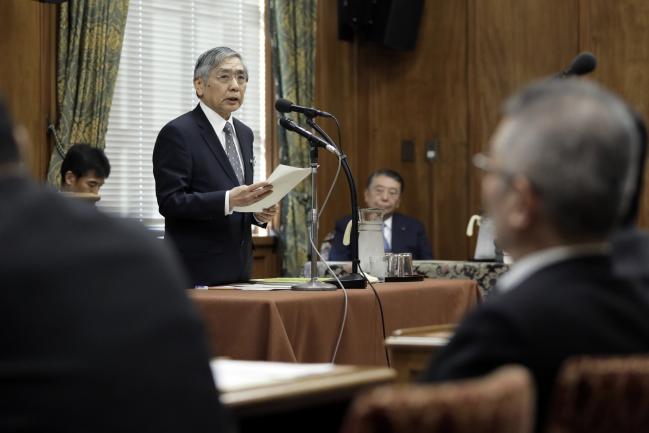(Bloomberg) -- The Bank of Japan stayed the course with its monetary stimulus at Governor Haruhiko Kuroda’s final policy meeting before his new term begins next month.
The BOJ kept its yield-curve control settings and asset purchases unchanged, a result forecast by all economists surveyed by Bloomberg.
With inflation still far from the BOJ’s 2 percent target, Kuroda made it clear during parliamentary confirmation hearings this week that "powerful monetary easing” is here for a while. The two new deputy governors who are set to join the board later this month also endorsed continued monetary easing.
This will put the BOJ further behind its global peers, who are either raising interest rates or turning toward normalizing policy. The European Central Bank on Thursday unexpectedly dropped a pledge to ramp up bond buying if the economy deteriorates.
With a stronger yen threatening progress on inflation, economists have pushed back their forecast dates for changes to the BOJ’s stimulus program. The currency has gained around 5 percent this year and last week it touched the strongest level since November 2016.
“The yen is of course adding to reasons for the BOJ to be cautious,” Sayuri Shirai, a former BOJ board member, told Bloomberg on Thursday. “There is no way for the BOJ to move just before they have new comers. Kuroda will continue with the current stimulus for a while.”
Kuroda jolted markets last week -- adding to the yen’s strength -- when he told lawmakers that in around fiscal 2019 the BOJ would start thinking about an exit strategy. But this assumes the inflation target will be met, and what he didn’t mention was that seven of nine current board members view risks to its price forecasts as tilted to the downside.
More than 90 percent of analysts surveyed by Bloomberg don’t believe the BOJ will hit its price target by its stated time frame of around fiscal 2019.
With Prime Minister Shinzo Abe’s coalition government holding a majority in parliament, lawmakers will almost certainly approve Kuroda’s reappointment, as well as the nominations of Masayoshi Amamiya, a veteran BOJ policy architect, and Masazumi Wakatabe, a reflationist, as deputy governors.
More: Here’s What We Learned About the BOJ From 12 Hours of Testimony
Japan’s subdued inflation stands at odds with eight quarters of economic growth and an unemployment rate of 2.4 percent -- the lowest since 1993. Core inflation, which excludes fresh food, was 0.9 percent in January.
And the growing risk of a global trade war is now darkening the outlook. Exports have been a driving force in Japan’s recovery.
“The economy is performing well but the BOJ isn’t at a point where it can talk about policy normalization at all,” said Takashi Shiono, an economist at Credit Suisse (SIX:CSGN) Group. “They don’t want to invite a stronger yen because that will make it harder to achieve its target.”
Kuroda will hold a press briefing at 3:30 p.m. local time.
